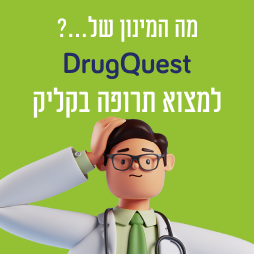Quest for the right Drug
ממוריט 10 MEMORIT 10 (DONEPEZIL HYDROCHLORIDE)
תרופה במרשם
תרופה בסל
נרקוטיקה
ציטוטוקסיקה
צורת מתן:
פומי : PER OS
צורת מינון:
טבליה : TABLETS
עלון לרופא
מינוניםPosology התוויות
Indications תופעות לוואי
Adverse reactions התוויות נגד
Contraindications אינטראקציות
Interactions מינון יתר
Overdose הריון/הנקה
Pregnancy & Lactation אוכלוסיות מיוחדות
Special populations תכונות פרמקולוגיות
Pharmacological properties מידע רוקחי
Pharmaceutical particulars אזהרת שימוש
Special Warning עלון לרופא
Physicians Leaflet
Overdose : מינון יתר
4.9 Overdose The estimated median lethal dose of donepezil hydrochloride following administration of a single oral dose in mice and rats is 45 and 32 mg/kg, respectively, or approximately 225 and 160 times the maximum recommended human dose of 10 mg per day. Dose-related signs of cholinergic stimulation were observed in animals and included reduced spontaneous movement, prone position, staggering gait, lacrimation, clonic convulsions, depressed respiration, salivation, miosis, fasciculation and lower body surface temperature. Overdosage with cholinesterase inhibitors can result in cholinergic crisis characterised by severe nausea, vomiting, salivation, sweating, bradycardia, hypotension, respiratory depression, collapse and convulsions. Increasing muscle weakness is a possibility and may result in death if respiratory muscles are involved. As in any case of overdose, general supportive measures should be utilised. Tertiary anticholinergics such as atropine may be used as an antidote for Memorit overdosage. Intravenous atropine sulphate titrated to effect is recommended: an initial dose of 1.0 to 2.0 mg IV with subsequent doses based upon clinical response. Atypical responses in blood pressure and heart rate have been reported with other cholinomimetics when co-administered with quaternary anticholinergics such as glycopyrrolate. It is not known whether donepezil hydrochloride and/or its metabolites can be removed by dialysis (haemodialysis, peritoneal dialysis, or haemofiltration).

פרטי מסגרת הכללה בסל
1. התרופות האמורות יינתנו לטיפול סימפטומטי במחלת אלצהיימר ובהתקיים כל התנאים האלה: (1) המטופל אובחן כסובל ממחלת אלצהיימר (Probable Alzheimer's disease) לפי הנחיות המכון הנוירולוגי הלאומי האמריקאי (NINCDS ADRDA) או על פי קטגוריות מחלה 290.10/290.0 שלפי ה-DSM IV (הגדרות האיגוד האמריקאי לפסיכיאטרייה) (2) המטופל דורג ע"י Mini-mental state exam (MMSE) score כנכלל בדירוג בין 10-26. (3) המטופל עונה על כל התנאים האלה: (א) המטופל אינו סובל מנכות גופנית קשה כתוצאה ממחלה ניוונית של המוח למעט פרקינסון או דמנציה מסוג LBD (Lewy body dementia) ; (ב) המטופל לא סובל מאחד מהמצבים האלה: (1) מחלה נפשית או נוירולוגית המלווה בדמנציה מישנית; (2) מחלות כרוניות קשות שהתסמינים הקליניים שלהן משמעותיים למרות טיפול תרופתי; (3) התמכרות לאלכוהול או סמים. (ג) החולה אינו שוהה באופן קבוע במחלקה סיעודית. 2. מתן התרופה ייעשה על פי מרשם של רופא מומחה בפסיכיאטרייה, נוירולוגיה או גריאטריה. 3. הטיפול התרופתי במטופל יופסק באחד או יותר מהמצבים הבאים: (1) הופעת תופעות לוואי חמורות או מסוכנות. (2) הידרדרות קוגניטיבית המתבטאת בשינוי לרעה ב-MMSE של יותר מ - 3 נקודות במהלך 6 חודשים או שינוי לרעה ב-ADAS-Cog (Alzheimer’s disease assessment scale-cognitive functions subscale) של 4 נקודות במהלך 6 חודשים. (3) הידרדרות בחומרת המחלה לדרגה חמורה (Severe).
מסגרת הכללה בסל
התוויות הכלולות במסגרת הסל
| התוויה | תאריך הכללה | תחום קליני | Class Effect | מצב מחלה |
|---|---|---|---|---|
| אלצהיימר | 01/01/2000 |
שימוש לפי פנקס קופ''ח כללית 1994
לא צוין
תאריך הכללה מקורי בסל
01/01/2000
הגבלות
תרופה מוגבלת לרישום ע'י רופא מומחה או הגבלה אחרת
מידע נוסף
